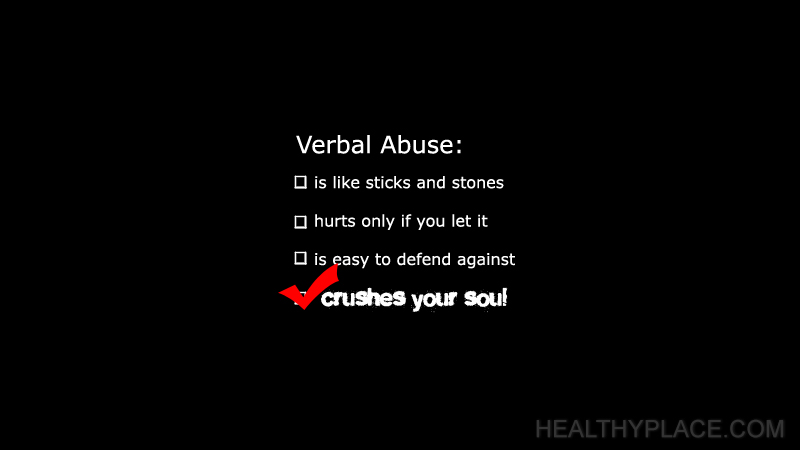The Effects of Verbal Abuse and How They Hurt

The effects of verbal abuse hurt me in both the short-term and long-term. Short-term effects of verbal abuse were the sting of his words or suggestions and the long nights spent crying silently to myself, figuring out what I needed to do to make the relationship better. Long-term effects, for me, are posttraumatic stress disorder and major depressive disorder. Some victims of abuse suffer dissociative identity disorder, too.
How does that happen? Why does a healthy person become a victim suffering from mental disorders?
Effects of Verbal Abuse Move In Slowly
In the beginning, the effects of verbal abuse are not readily apparent; victims notice something is different, but it's hard to explain the problem. When friends ask why you're down, you may say, "We're going through a rough patch in our relationship." And when friends ask you to explain the rough patch, you'll say something like, "I don't know...he is so moody and it's hard to communicate" or "Beats me...Women. [eye roll]".
Victims of the effects of verbal abuse are lucky if they connect their feelings to domestic violence early in the relationship, but that rarely happens. The victim often ignores or misinterprets both the abuse and the effects of verbal abuse because verbal abuse itself throws you off-balance and makes you unsure of yourself. Those feelings are caused by verbal mind-games like brainwashing and gaslighting.
Later Effects of Verbal Abuse
Later on, the effects of verbal abuse either mimic or become depression and anxiety. I believe that eventually, science will show that abuse forces the brain's neural pathways to create deep ruts of depression and anxiety. (Don't go telling your friends that - it's just my theory.) For now, all we know is many victims of abuse end up with depression and/or anxiety and worse.
To complicate matters, after a person feels off-balance enough to seek treatment, the symptoms of abuse (depression/anxiety/etc.) tend to be treated instead of dealing with the cause (the abuse). In my experience, when doctors figured out that I was depressed, their questions stopped. They treated the depression without probing further to discover the cause. How could depression go away when I lived with the dis-ease (abuse) that causes it?
The Effects of Verbal Abuse List
Ms. Patricia Evans gives a list of the effects of verbal abuse in her book The Verbally Abusive Relationship: How to recognize it and how to respond. The following list does not include all of the effects of verbal abuse that Ms. Evans listed in her book. I assume that most of the effects of verbal abuse she lists would affect men too.*
The effects of verbal abuse can cause a victim to:
- distrust her spontaneity
- suffer a loss of enthusiasm
- live in a perpetually in a ready, on-guard state
- wonder about how she is coming across
- think and feel that something is wrong with her
- soul-search and review incidents in hope of determining what went wrong (see Ruminating Can Harm Your Mental Health Recovery)
- wonder why she isn't happier and feels that she should be
- sense that time is passing and she is missing something
- tend to live in the future -- "Everything will be great when/after," etc.
Those effects of verbal abuse illustrate symptoms similar to depression, anxiety and low self-esteem. The chicken and the egg question does not apply when it comes to domestic violence and abuse. The abuse comes first. Then the mentally healthy victim succumbs to insecurity and mental disorders. If the abuse victim-to-be is mentally unwell when meeting the abuser, the abuse will worsen the mental illness or create new illnesses.
Your best defense against abuse is to take care of yourself physically and mentally and be aware of the signs of an abuser.
*If you're a man and want to explain how males feel differently as compared to Ms. Evans's list, please comment.
*Both women and men could be abusers or victims, so please do not take my pronoun choices as an implication that one gender abuses and the other is victimized.
APA Reference
Jo, K.
(2015, January 19). The Effects of Verbal Abuse and How They Hurt, HealthyPlace. Retrieved
on 2025, December 23 from https://www.healthyplace.com/blogs/verbalabuseinrelationships/2015/01/the-effects-of-verbal-abuse-and-how-they-hurt-me
Author: Kellie Jo Holly
I felt like this back when I lived at home. For most of my childhood that I can remember. (my abuser was my mother)
Aha, hit me like like a bolt of lightening, your comment about how you felt you were missing something. I felt that way too, for YEARS! I left my >20 year abusive marriage almost 3 years ago. Got divorced about a month ago. And now, finally, I don't feel like I'm missing the ever elusive "IT" , that unknown thing I could never put my finger on but felt deeply. Ha, it was called "life"!!!! I have one now :) Thank you for this moment of clarity!
